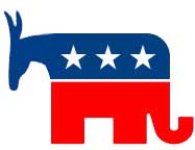Congress & Corporate Welfare
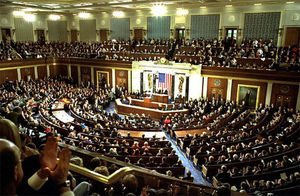 © by Stephen Neitzke, 2006
© by Stephen Neitzke, 2006
 © by Stephen Neitzke, 2006
© by Stephen Neitzke, 2006
 © by Stephen Neitzke, 2006
© by Stephen Neitzke, 2006
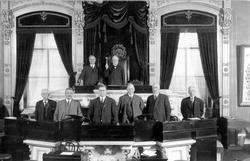 © by Stephen Neitzke, 2006.
© by Stephen Neitzke, 2006.(1) Individual citizens have the right to be politically equal with all other citizens.
(2) The sovereign people have the fundamental right to speak for themselves, in their voting majorities.
(3) The sovereign people have the fundamental right to be their own sovereign masters, democratically and directly electing all of their public servant representatives.
(4) The sovereign people have the fundamental right to remove any elected representative, for cause, without interference from government.
(5) The sovereign people have the fundamental right to control the output of legislation by formulating their own, by vetoing law made by government, and by affirming existing law in such a way that government is barred from amending it -- at every jurisdictional level, without interference from government.
(6) The sovereign people have the fundamental right to alter details of their governance, without interference from government.
(7) The sovereign people have the fundamental right to protect themselves from themselves by establishing the powers within government to administratively, legislatively, and judicially prevent zealous majorities, greedy corporations, the corrupting superrich, and government itself from violating individual and minority citizen rights, as given in the constitution and laws.
Administrative functions:
(1) The people's direct election of all representatives; done in open, fair, and peer-reviewed referendums called 'elections' (most Americans have been so propagandized into ignorance that they do not recognize "elections" as being either referendums or direct democracy), and
(2) the people's recall of a public official's election who has violated the public trust or simply offended too many citizens; done by petition process.
Legislative functions:
(3) The people's constitutional amendment initiative, to propose amendments to our consitutions without government interference; done by petition process;
(4) the people's statute law initiative, to propose statute law without government interference; done by petition process;
(5) the people's statute law veto, now known as the "referendum" (should be changed to the "remand" to minimize confusion), to reject statute law made by representative government; done by petition process; and
(6) the people's statute law affirmation to bar government from amending a law that the people do not want changed; done by petition process.
Consultative functions:
(7) The legislature's statute law referral to the people's referendum, and
(8) the legislature's constitutional amendment referral to the people's referendum.
 © by Stephen Neitzke, 2006
© by Stephen Neitzke, 2006
The nation's most successful civil rights law, the Voting Rights Act of 1965 (VRA), which has enjoyed bipartisan support in Congress for over 40 years and has been reauthorized four times by both Democratic and Republican presidents, was derailed today in the House.
A small group of House Republicans, including Lynn Westmoreland, R.Ga., hijacked an important vote to renew key protections in a law that has changed the face of American politics. ...
Civil rights groups said that despite significant progress made during the last four decades, there is no question that barriers to full and equal minority voter participation remain.
"Many of those trying to derail the Voting Rights Act represent states with the most egregious records of discrimination in voting-- discrimination that continues to this day," said Wade Henderson, executive director of the Leadership Conference on Civil Rights.
RenewtheVRA.org, a collaborative of national organizations with strong experience protecting minority voting rights, which includes LCCR, the NAACP and NAACP Legal Defense and Educational Fund, Lawyers' Committee for Civil Rights Under Law, and the ACLU, commissioned a series of reports that detail continuing threats to voting rights in the states covered by the VRA's expiring provisions.
Read more.
 © by Stephen Neitzke, 2006
© by Stephen Neitzke, 2006(1) The people's direct election of all representatives; done in open, fair, and peer-reviewed referendums called 'elections', and
- Administrative functions:
(2) the people's recall of a public official's election who has violated the public trust or simply offended too many citizens; done by petition process.(3) The people's constitutional amendment initiative, to propose amendments to our consitutions without government interference; done by petition process;
- Legislative functions:
(4) the people's statute law initiative, to propose statute law without government interference; done by petition process;
(5) the people's statute law veto, now known as the "referendum" (should be changed to the "remand" to minimize confusion with referendum-the-vote), to reject statute law made by representative government; done by petition process; and
(6) the people's statute law affirmation to bar government from amending a law that the people do not want changed; done by petition process.(7) The legislature's statute law referral to the people's referendum, and
- Consultative functions:
(8) the legislature's constitutional amendment referral to the people's referendum.
 © by Stephen Neitzke, 2006
© by Stephen Neitzke, 2006
 © by Stephen Neitzke, 2006
© by Stephen Neitzke, 2006"Judge Defers Decision on U.S. Wiretap Suit", By Jui Chakravorty, Reuters, 12 June 2006.DETROIT (Reuters)—A federal judge on Monday deferred making an immediate decision on a request that the Bush administration's domestic eavesdropping program be halted as a violation of law. The American Civil Liberties Union, which filed the lawsuit in January, asked U.S. District Judge Anna Diggs Taylor to stop the White House from intercepting international phone calls and e-mails without a warrant in its fight against terrorism, saying it violates Americans' free speech and privacy rights. ... Taylor deferred any ruling. Another hearing is scheduled for July 10. (Published by Baseline, 13 June 2006.)
 © by Stephen Neitzke, 2006
© by Stephen Neitzke, 2006
 © by Stephen Neitzke, 2006
© by Stephen Neitzke, 2006
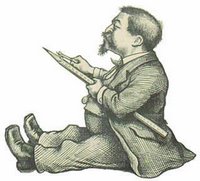 © by Stephen Neitzke, 2006
© by Stephen Neitzke, 2006© by Stephen Neitzke, 2006
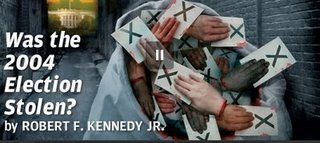 who are supposed to be preserving our Constitution and our rights.
who are supposed to be preserving our Constitution and our rights."... After carefully examining the evidence, I've become convinced that the president's party mounted a massive, coordinated campaign to subvert the will of the people in 2004. Across the country, Republican election officials and party stalwarts employed a wide range of illegal and unethical tactics to fix the election. A review of the available data reveals that in Ohio alone, at least 357,000 voters, the overwhelming majority of them Democratic, were prevented from casting ballots or did not have their votes counted in 2004 (12) -- more than enough to shift the results of an election decided by 118,601 votes (13) ...".
